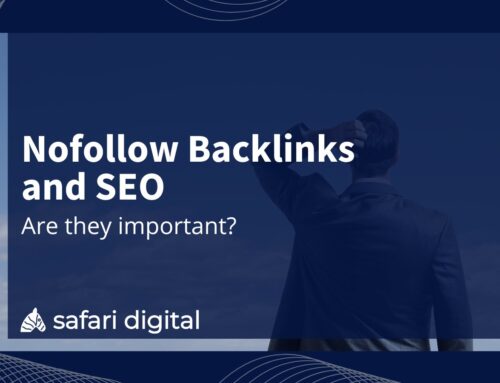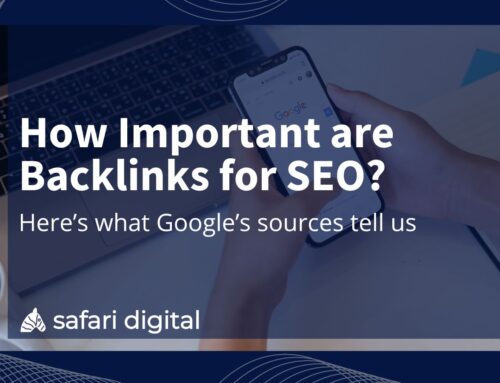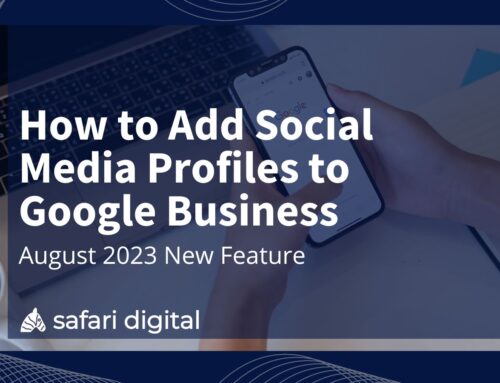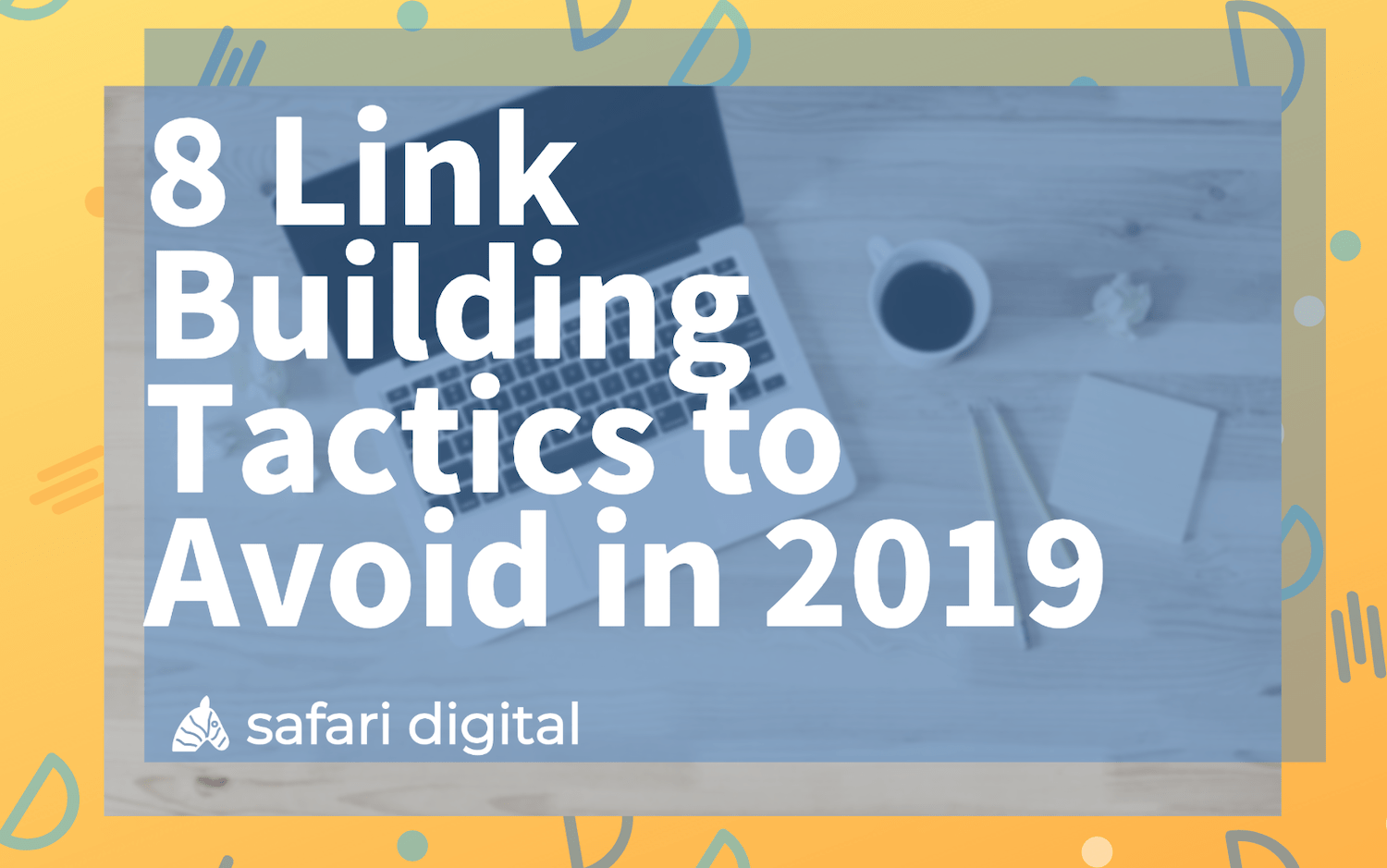
Link building is one of the most difficult and time-consuming aspects of SEO. Make sure you’re spending your time wisely. Here are 8 link building tactics to avoid in 2020.
It seems like every few months there’s a new story floating around the SEO community that indicates links are becoming less important for search engine visibility. As far as we can tell, these kinds of articles will float around for one of two reasons.
- SEO professionals are trying to throw other marketing professionals off the scent. It seems crazy, but when thinking about why people diminish the importance of links in an SEO strategy. Therefore it seems only logical that one of the reasons is that they are trying to throw digital marketers off the scent. Perhaps they want to convince other marketing professionals to spend their time looking at other areas of SEO.
- Because getting links is really hard. Ask any of your professional and I’ll tell you that link building in a legitimate white hat manner is it the most difficult aspect of search engine optimisation. Depending on how you go about it, it can involve writing huge pieces of informative content in the hope that don’t get scared, or you are reaching out to webmasters hoping that they will let you publish a Guest Post. Irrespective how you do it, link building is the most time-consuming and difficult aspect of search engine optimisation.
If you’re seeing these scaremongering articles floating around diminishing the importance of links in SEO, it’s best to look the other way. As of 2020, links continue to play an essential role in the search algorithm.
Ever since the Google Penguin update, Google has been cracking down on websites that employ unsavoury link building tactics that are deemed to be manipulative. The flip side of this was that websites that have a lot of high-quality incoming links are being rewarded. On the other hand, bad links can cause irreversible damage to your website.
So, before we get into link building tactics to avoid. Let’s start with some basic housekeeping.
What is a ‘Bad Backlink’?
A bad backlink comes from unrelated or untrustworthy sources from around the web. Bad backlinks will usually come around for one of three different reasons:
- You have worked with an SEO company or link building company who have generated low-quality backlinks for your website.
- Your content and links have been scraped or your website has been submitted to a low-quality directory.
- Your content has been linked to by a website that you don’t want to be associated with.
To avoid having bad backlinks, it’s important to regularly monitor links coming to your website and perform a backlink audit. This can be done using Google Search Console or any number of paid or free SEO tools.
This guide will explain eight types of backlinks that can get you penalised and what you can do to avoid them.
1. Bulk Directory Submissions
Not all directory submissions are negative for your SEO. In fact, there are a number of reputable directory submission sites that can enhance your search engine presence and provide link diversity for a healthy link profile. Whenever our Sydney SEO consultants start working with a new client we will build foundational links using trustworthy directories. But you need to be careful when building directory links.
There are a number of directory submission services that claim to deliver rankings boosts by using their services. But you need to avoid these like the plague. Submitting your website to low-quality directories will do a lot more harm than good for your website.
When submitting your website to directory submission sites within your niche, a good rule of thumb to remember is how often have you viewed this directory site in the past? If you’ve never heard of the directory site or it’s the first time you’ve used it, it’s best to stay away.
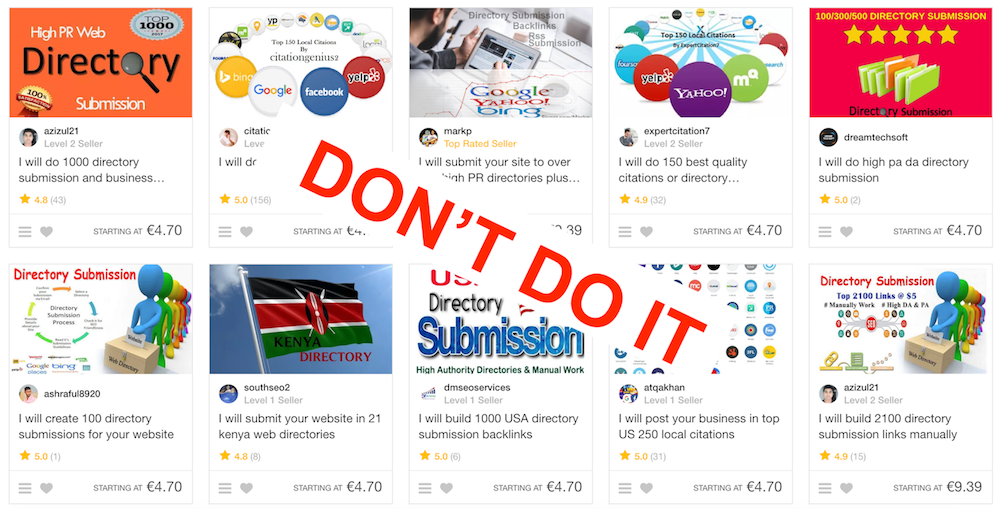
2. Links Without Context
Getting high-authority links is great. But If they have no relevance to your niche or are inserted in a way that is completely out of context, they may actually be damaging. A non-contextual link is one that is completely irrelevant to the content in which it is featured. If the link makes readers scratch their heads, it’s probably going to attract the wrong kind of attention from Google.
So then, what is a ‘contextual link’?
A contextual link is a type of link that is found within the body of content. Contextual links provide the reader with further information about the topic that they are reading about. A contextual link should enhance the experience for the user, not bombard them with affiliate offers.
3. Blog Commenting
Building links through blog comments is one of the most used and abused Blackhat link building tactics. As a result, Google (almost without exception) completely ignores blog comment links. One simple step that most webmasters take to avoid blog comment spam is to mark them all as ‘no-follow’.
If Google detects that you are building links in a manipulative way through blog comments then there is a high chance you could be penalised.
So, if you’re thinking about building links through blog commenting remember this. The best-case scenario is that they will be completely ignored by Google, the worst-case scenario is that they will result in a penalty for spam. Don’t waste your time.

4. Forum Spam
Spamming forums is one link building tactic that died with Google’s Penguin update in 2012. Since then, Google has almost completely devalued links from forums. Google also punished thousands of websites whose backlink profiles were largely made up of low-quality forum and blog comment links.
That doesn’t mean that you should avoid interacting and sharing content with like-minded individuals on forums. However, you do need to exercise caution when offering up links to your own content.
If you’re using forums for the sake of building links, you need to stop immediately. Building signature links, in-text links, or posting naked URLs to your website on forums will almost certainly be flagged as spam. Whatever value that you may receive from posting links to forums is HEAVILY outweighed by the risks associated with doing so.
5. Over-optimised Anchor Text
Google is more perceptive than ever, which means you don’t need to include your most important keywords in your anchor text. While it was once considered favourable to have an exact match anchor text when building links to a specific page, this practice is now considered “spammy”. In fact, a high-quantity of exact match anchor text links could be a good enough reason for Google to put your website in the sandbox.
If we are going to put anchor text into percentages, it should look something like this.
Brand Anchor Text: 70%
Naked URL Anchor Text: 15%
Generic Anchor Text (i.e. ‘click here’ or ‘website’): 10%
Partial Match or Secondary Keyword: 4-5%
Exact Match: <1%
There are a lot of people who still harp on about the importance of exact match anchor text. The most important thing to remember is that your anchor text needs to be natural. If a website is genuinely citing your website as a reference, the chances of them using your exact keyword is extremely low.
A website that we worked on recently was the victim of a negative SEO attack from a competitor. The Negative SEO involved sending 50+ exact match anchor text links from low-quality websites to several of the highest performing pages. Take a look at how that impacted rankings:

While It was fairly straight forward to recover, the practice of sending dozens of exact match links was an automatic red flag from Google. If you’re flooding your website with a high-quantity of extremely targeted links, Google is going to get suspicious. The value of links isn’t derived from the anchor text, it comes from the link.
6. Footer Links
Footer, header, and sidebar links were once considered an effective link building tactic to rapidly increase the number of incoming links to your website. These links would generally carry over to each page on the domain and contribute dozens, hundreds, or thousands of incoming links to a website.
Web design companies and SEO agencies in the early 2000s were notorious for sticking their link into the footer of a client’s website. At a time when websites were rewarded by the sheer quantity of links, this was considered to be a fairly effective way to rapidly increase the number of incoming links.
In reality, Google will view footer links as a single link. In our experience, having hundreds or even thousands of links with the same anchor text and coming from the same domain is a risk not worth taking.
7. Link Exchanges
Link exchanges (or reciprocal linking as it is sometimes referred to) is when you link to a site in exchange for them providing a link back to your site. It’s a simple theory. This idea is that you are diversifying the link profile of a peers site in exchange for them doing the same for you.
Link exchanges are not inherently bad, however, if you’re going to go down this path you need to exercise a degree of caution. Google is becoming more sophisticated in the way that it detects link patterns. As such, websites that are regularly exchanging links are likely to draw some unwanted attention. As far as link building tactics go, it’s not the worst — but you do need to be careful.
8. Hacked Backlinks
If we’re going down the path of link building tactics that you should avoid, it would be remiss not to mention the biggest taboo of all — hacked backlinks.
A hacked backlink is acquired when a link is placed into the site code when a site is hacked. Often the link will not be immediately visible in the text, instead, it will be hidden on a page element or an image.
Now, you may be thinking: “I would never hack another website”. And while this may be true, you should be cautious of ‘link building services’ that are offered to you. Unbeknownst to you, some professional link builders may resort to hacking backlinks and delivering it to you as a link that they have acquired naturally with the consent of the webmaster.
Hacked backlinks are not only immoral and against Google’s webmaster guidelines, they are illegal. If you are working with an SEO professional, you should be asking where the links are coming from and how they are acquiring them.



